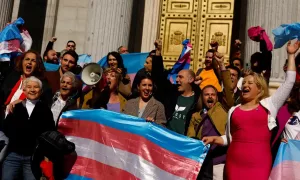This article is part of a series covering the IE’s 13th Reinventing Higher Education Conference that took place from March 5-7 2023. The Stork’s current Editor in Chief, Roché Smith Rabie, was sent to the conference to cover the event and represent student voices. To learn more about the conference itself please refer to the previous article in the series here.
Universities often try to convince their students that the institution that they chose as the key to the next phase of life is better than the rest. University students are pitted against one another for the sake of competing for research grants, scholarships, and even rankings. However, in reality, all university students want the same thing: to know that their chosen institution will prepare them to make a difference in the world.
At last week’s Reinventing Higher Education conference, having the opportunity to meet students from a university on a completely different continent to my own only furthered this conclusion.
As part of the conference’s activities, 34 University of Cape Town (UCT) students and 3 IE University students and alumni were integrated into a design thinning workshop with the representatives of over 30 universities from around the world and other invited guests. Together they were tasked with imagining what universities could look like in 2050 and had to draw from these visions, concrete Principles, Values, and Impacts that a university of the future could stand on. Later on, it was left up to the students, then placed in four groups of eight, to further refine their ideas into conceptual models and then present them to the audience present at the conference as part of a student panel.
Student Vision for Higher Education
I had the opportunity to be a part of this student panel and was placed into a group with 7 UCT students to hypothesise this vision of ‘the university of the future’. Our design focused on the concepts of accessibility and inclusivity into university through the understanding that solutions created by all will therefore serve all. We also stressed the one health approach in which universities had to include not only the health of students into their scope but also that of the surrounding community and environment, therefore embodying the Ubuntu philosophy. Ubuntu was a key philosophy discussed throughout the conference and is the belief that we are human only through the humanity of others, highlighting the importance of cooperation.
When we were asked to share what the hardest part of working together was after presenting our ideas to the audience, my first thought was nothing. In the hours we had spent together we had all been able to work together with ease, as in the end we all felt strongly about the exact same issues. Even when reviewing the work of each of the team members before we were reshuffled it was amazing to see the exact same concepts written on each and every board.
No matter how different we may seem or how far away from each other we may live, in the end we all want the same thing: to know that our chosen institutions will prepare us to make a difference in the world.
Integrating the student voice into this year’s RHE Conference was a ‘unique approach’ many commented, but in reality it should be the only approach.
How can one try to solve problems when the key individuals affected most by these decisions are not given a seat at the table?
Who knows if any of our visions for the university of 2050 will actually come to light, but at least students will start to be part of the solution instead of stuck on the outs. I hope that President Santiago Iñiguez’s suggestion for each university to bring along two student representatives to next year’s conference in Miami does not fall on deaf ears, as in the end, what is a university without its students?
As the President of the American University in Beirut, Fadlo Khuri, said best,
“Universities will only survive once we realise that it’s all about the students.”
And if all university students all want the same thing, then it shouldn’t be so hard to make the necessary changes.






